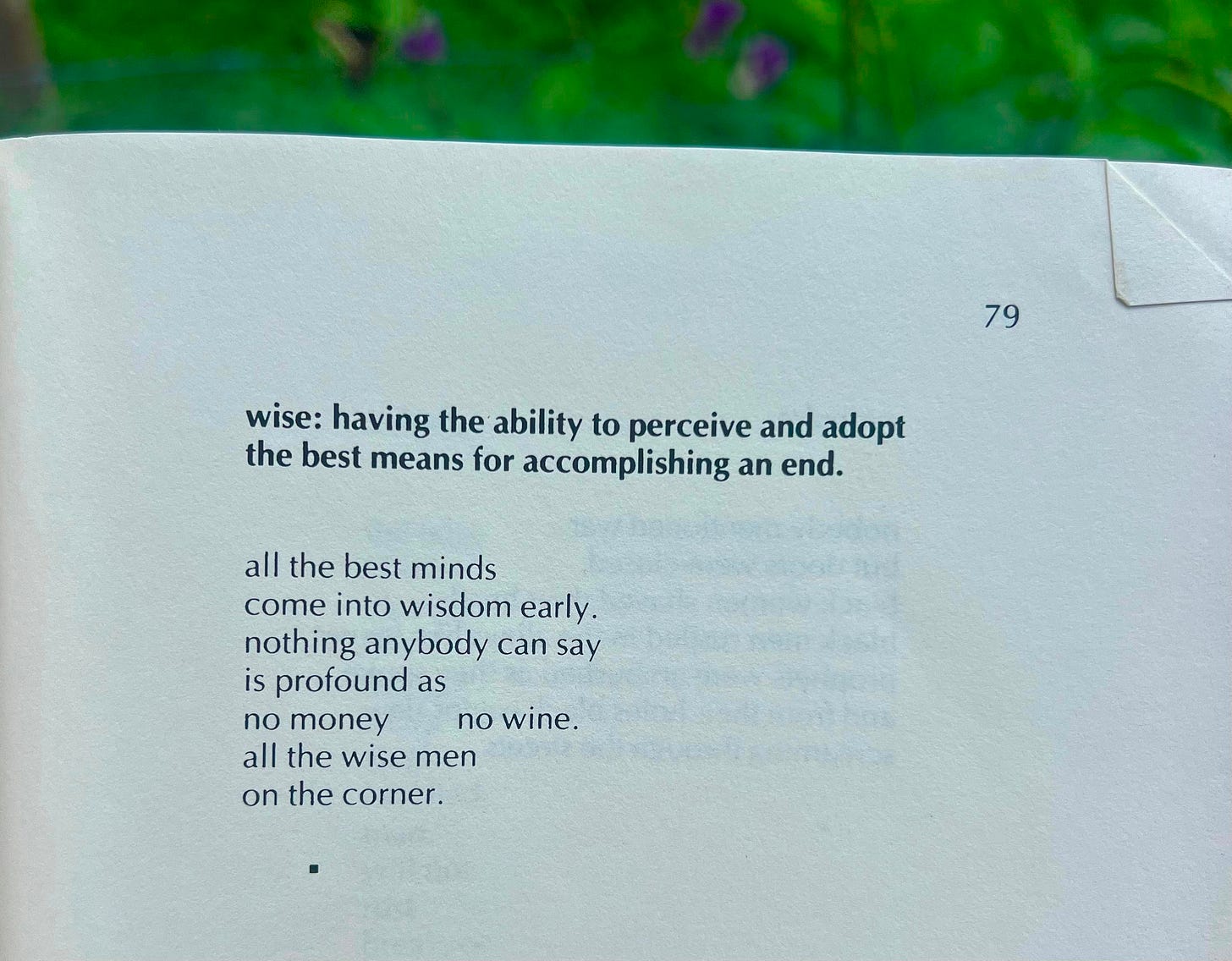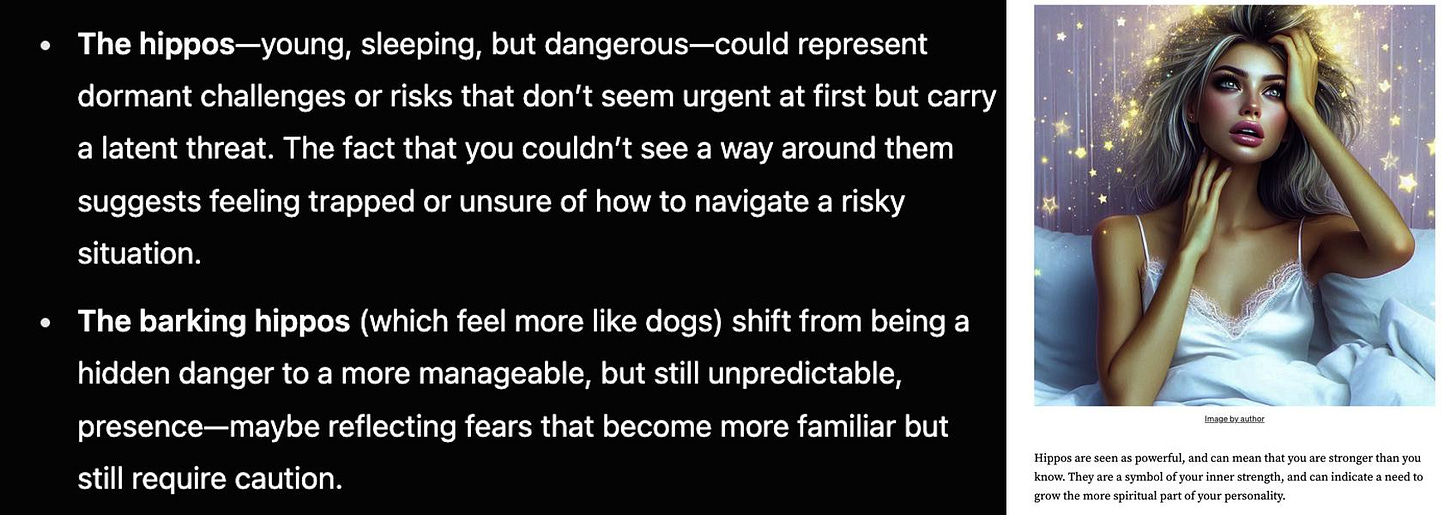Edition #187: My AI Experiment
Getting into the arena with the writer's arch-nemesis. Plus, inside the living rooms of powerful New Yorkers, how to be generous, and a sleep hypnosis.
A Note From the Editor
Last week, I had a new friend over for dinner. It was our first time hanging out one-on-one. When she left, I felt the pleasant buzz that comes after talking too much. I was doing the dishes when my phone pinged with her message.
Sure! Here is a polished, friendly response you can send after….
I only read the first few words before she deleted the message, but it was enough to deduce she had planned to use AI to send me a post-dinner note. Now would be the real friendship feasibility test. I playfully remarked that it was too late, for I had already seen the message. I voice memo to ChatGPT for like everything, she admitted. Her follow-up message was sweet and human. Far better, I suspect, than any polished, friendly computer-generated response would have been.
The interaction might have thrown me for a loop, but I’d experienced this a few times before. Earlier this year, a group of new-ish friends came over for a 2024 reflection. Over the course of the evening, I discovered they all used AI with surprising (to me) regularity: to build strength training workout programs, to analyze who was right and who was wrong in romantic spats, to increase efficiency.
I recall sitting on my couch in a daze after I made this discovery. I felt judgmental in that righteous way that is based on nothing but a loosely constructed moral stance to the tune of, Can we not use our brains for anything anymore? Why are we so obsessed with shortcuts? And why must machines supplement knowledge about things we should naturally be able to be in touch with—our bodies, our emotional cycles, our sense of right and wrong?
__________
For some additional context, AI is meant to be a writer’s arch-nemesis. There are many use cases for AI, a majority of which I know nothing about, but in the most common, public-facing format, the primary output is that AI is an engine that generates text. Language. Words. And words are a writer’s sacred tool; our only tool. A writer’s authorial voice is constructed over months and years and decades of practice. There is no shortcut to writing well; one must write and write and write some more. It takes consistency and a brain, a keen observing eye, introspection, and a reverence for the sanctity of language. We can look to the great poets to be reminded of what tenderly chosen words can do, even in brevity.
Tools like ChatGPT naturally erode our use of language, degrading the function of words from something that can yield great power to something far more sterile. Consider the IRL adoption of internet speak, or the way text message communication gradually bled into our real-world communication patterns. In both cases, we, the masses, stylistically adopted our verbiage to short-hand and slang, carrying phrases born from the digital discourse into the real world. Sure, our internet speak might give our grandparents headaches, but it was created and is born fresh with each generation.
The linguistic style of AI is different. Though generative, it is not inherently creative—it’s more of a word-slop salad with an air of generic empathy kept at an appropriate emotional distance. AI’s standard tone is reminiscent of an HR manager who recently completed a required training in emotional EQ. Unless, of course, you direct it otherwise. It can then become an HR manager wearing cool sunglasses.
Now, consider what happens when we use AI so often—to write every work email and to craft banal text messages—that our brains begin to think in that generic, HR manager tone. It might sound far off, but it isn’t. You are what you eat; you are what you read.
__________
I recently invested in my first buy-and-flip real estate venture with a dear friend. When I read the listing description, I almost wouldn’t have caught that it was AI-generated except that I have come to recognize a few key stylistic tendencies in the language model—call it AI’s authorial voice. In an AI-generated descriptive statement, you will always find the following sentence structure: “It’s not (this), it’s (this),” or “That isn’t (this), it’s (this).”
Still, I liked the description and told my friend as much. She used Gemini and prompted it to write the description in the tone of Sunset Magazine. She had recently used this trick to write her realtor bio as well, in the tone of Madewell. The result was actually so good, she said. “Lots of things about being comforting and trusting.”
She had learned how to direct AI in a way that worked for her—she was on to something. A few weeks ago, I met a software engineer at Tesla. Before that, he was an engineer at Reddit. We were talking about AI, he burgeoning field of prompt engineering, and how the rise of these technologies might impact our respective professions. He repeated something a mentor or boss had recently told him: “These days, the best programming language is English.”
__________
I’ve become fascinated with the use cases of AI. Like caffeine, recreational drugs, or exercise, it can be a vice or a tool. Its usage is often highly personal, and it has the potential to influence one's performance in life. I did not consciously begin to use AI experimentally until very recently. Before, my automatic response was, “No, this is bad,” or ignore. But for better or worse, I am a curious cat, preferring to get inside the train and ride it before writing my review.
And so, despite my initial resistance, I began to use AI. It was tactile at first. I used it to research a few articles I was writing. It was unhelpful, the information outdated or just plain wrong, and the language distractingly fluffy. Some of this course corrected as I got better at prompting, but those initial trials were enough to assuage me of any fears about AI taking my job.
Little by little, I went more in-depth with my questions. I recall a turning point when its reply began with, “Based on what I know about you,” and proceeded to identify a few key dynamics I’ve been experiencing as an expat in a small surf town. This is it, I thought, I am feeding the beast that will one day consume me. I prompted the tool about that, too. Would it take over the world, was it selling all of my soul-bearing data to advertisers? No, it assured me, it was only here to help. And if a change in data-sharing policies ever arose, I would be alerted.
I remain skeptical because when has big tech ever been altruistic? When there’s a dollar to be made, it will be made. Still, I've continued my experiments. As a result, I’ve come up with a few personal use cases for AI, specific to no one but me and my interests.
AI as a dream interpreter
I have dreams so vivid that they stick with me for days. I often wake from these dreams steeped in feeling and curious about the messages my subconscious might be revealing. Problem is, dreams make no sense to Google’s search query style. To search for a dream’s meaning on Google, one must pick a single aspect of a layered dream, i.e., hippos, which only leads to a kooky, crazy dream interpretation corner of the internet.
ChatGPT is more skilled in this arena. Ironically, I’ve discovered typing out my dreams in detail often makes their “meanings” blatantly obvious, even before AI weighs in.
AI as a therapist for the uninclined (or as a crisis management tool)
From an uninsured American’s perspective, access to therapy is difficult to obtain and expensive. Your options are finding a practice with a sliding scale and a reasonable base rate, using a platform like BetterHelp (tried it, not great), or swallowing your pain and writing in a journal. Or, hear me out, supplementing with AI in those situations that require immediate support.
Imagine AI as a crisis hotline. I used it in this way recently, when I found myself 4,000+ miles away from home and in a very intense situation. It was the middle of the night everywhere else so I couldn’t phone a friend, but I needed an immediate sounding board to assess the severity of the situaiton. I turned to ChatGPT without much thought and found it a surprisingly useful tool, given the circumstances.
Which got me thinking about different demographic groups—my parents' generation, say, or a cohort of Gen Z and Millennial straight American men—and their resistance to traditional talk therapy. I can empathize with the aversion, don’t look under the bed and you won’t find the monsters, though I fall squarely in the camp that believes everyone could benefit from therapy. For those demographic groups who see therapy as indulgent or weak or unnecessary, I wonder if their willingness to participate might change if it happened in the privacy of their PC and with the knowledge that they weren’t interfacing with a real human being. Seems like those buffers might do the trick.
There are a lot of good counterarguments here—you can’t replace real therapy, AI would likely reinforce this person’s biases, etc. (I’m sure there are more, I’d love to hear objections to this idea in the comments). To those objections, I say, which is worse? No therapy, or the occasional robo-chat that might reinforce personal bias, but that also has the potential to alleviate pain and open people up to doing deeper work?
AI as a relationship inspector
This was the premier personal experiment I’ve done with AI, completed just last week. Spurred by the aforementioned 4,000 miles from home situation, I wanted to inspect the entirety of my adult relationship history to identify patterns, understand why they were repeating, and turn these insights into action. Could I have done this on my own? In theory, yes—especially the pattern finding part, especially because I love to journal. Still, I learned a few key new things with the aid of ChaptGPT, like the term fawn response.
The more useful bit was how to move forward while taking all this history into consideration. It took a bit of call-and-response prompting, but in the end, I came away with a pre- and post-date check-in ritual to keep my feet on the ground in those early stages of romance. As with the dream interpretations, part of the usefulness of this experiment was the reflection itself, gleaned from writing out my entire dating history in great detail.
AI as a DIY-quad-mechanic trainer
Do you ever get supremely irritated by an ongoing problem you cannot fix yourself? Same. My ongoing problem is my primary vehicle, a Honda quad. I live at the top of a mostly unpaved rocky mountain road. When my quad breaks, as it did this week, my life goes topsy-turvy. I am tasked with finding a mechanic, trying to communicate in my broken Spanish, and saying a prayer that I am not getting royally screwed over. There is no real way for me to know.
Unless…I learn to be my own quad mechanic. I fantasized about it in detail earlier this week—crawling under the heft of the machine, screwing and unscrewing bits and bobs, diagnosing the mechanical problems using nothing by my hard earned knowledge. A woman mechanic, so refreshing! I could service all the girls’ quads in town.
ChatGPT could ostensibly teach me how to do this, just as it could teach you whatever hard skill you want to learn that might lessen your life’s burdens. It would only pull from other how-to sources from around the internet, but would organize them in such a way that the barrier of entry to learning would be lower.
And finally, the accessibility/environmental caveat
I know what some of you are thinking—are you really OK with poisoning the environment for the sake of dream interpretation? I am not. Still, whether we like it or not, the world’s tech is inevitably moving in one, AI-centric direction. I want to interface with it so that I can attempt to understand its implications on our shared future.
From my bit of reading, the big AI electricity guzzler comes from training the models. Once they’re up and running, they allegedly require far less energy. Tech companies are being shoddy about how much energy is required to power AI, so there’s no real way to know. If there were some sort of governmental mandate to run all AI systems with renewable energy sources, the problem would become an opportunity. No chance of that happening in the good ol’ US of A anytime soon, but one can dream.
From an accessibility perspective, AI mimics the most idealized outlook on the function of the internet; making information easily accessible. All you need is WiFi connection and now you have a robo-therapist, a trade school teacher, an nutritionist, a physical trainer, luxuries many cannot afford in our inflation-laden world.
Or maybe we’re burning up all that fossil fuel so that people can turn their faces into the shiny, fairy versions of their faces. Maybe those fairy faces bring joy at a grim time. Maybe in a few months I’ll learn more and stake my claim against these tools. Who’s to say?
__________
Cheers, my dears, and as always, thanks for reading. Todays essay was an act of live, real-time discovery. I have been very anti-AI, but now I’d classify myself as AI-curious. At the very least it is an interesting topic to discuss. I’m eager to hear all points and counterpoints, if you feel so inclined.
Thank you for your patience last month as I navigated a complex situation that took me away from the world of newsletter writing and deep into the big, bad Real World. But I’m back!
This weekend, I’m hosting a private screening of my debut short film, which will take up most of my energy and brainpower. I plan to spend the remainder of the weekend reading the handful of books that are currently hooking me in (some poetry, some ethics, some philosophy, and a novel), surfing, and walking on the beach.
Have a beautiful weekend! Make a good PB&J, buy a cute or fun greeting card for future use, learn a magic trick.
Three Pieces of Content Worth Consuming
Inside The Living Rooms of Powerful New Yorkers. These images are incredible. I could fawn over their details for hours—Ella Emhoff’s quintessential vertical book stack, Lin-Manuel Miranda’s socked feet, Colson Whitehead’s loose papers on the coffee table, Em Rata’s tatty couch. And the body language! Martin Scorsese and his daughter holding hands, Tanya on Spike Lee’s lap. I would buy this as a coffee table book, especially if it included all kinds of New Yorkers and was organized by neighborhood.
50 Ways To Be Ridiculously Generous. I like the idea that generosity doesn’t have to be a financial transaction; one can act generously in a large number of ways. Being generous makes you feel good. I want to cultivate more mindfulness around positively impacting others in my day-to-day life, and these ideas got my brain working. I especially loved 10, 19, 30 (my heart!), and 44.
The Alabama Landline That Keeps Ringing. A beautiful, fascinating piece of journalism about a long-running help desk at Auburn University. The desk functions like this: callers can phone in from anywhere and ask any question they want, and student workers will attempt to answer said questions. The students are trained to be very polite and unobtrusive. Most conversations are quick, others are not—the phone line has a few rotating regulars. The human connection that stems from this setup is deeply touching.
“One of them talks about the hour they spent on the phone with a caller, helping her plan a trip from Arizona to Canada. Another talks about a kid who called to complain that he was bored, but clearly he was alone and very, very lonely. That was a long call.”
Perhaps You Should…Try Sleep Hypnosis
I am precious about my sleep. Eight to ten hours is what my body requires, yet sometimes stress or too much traveling make getting proper rest a mission. I moved around so much in April that my sleep was all out of whack, so I was determined to course correct this month—and simultaneously determined to boost my self-esteem, which led me to this sleep hypnosis. It worked like a charm.
On that note, I also loved this guided meditation in the same vein. My favorite takeaway was the idea of replacing your inner critic with an inner cheerleader.
**Bonus Content** (My Dream Life)
 Tiktok failed to load.
Tiktok failed to load.Enable 3rd party cookies or use another browser
I have a handful of dreams for this lifetime, one of which entails owning and operating a small regenerative farm that I live on part of the time with my cool/smart/hot/fun partner and our bi-lingual, barefoot children/farm hands who can also surf and are curious and kind and love to read. The farm will have chickens and goats and I’ll twirl one of the baby goats around, just like this.
Also, I want to see this film and eat this pasta, a reminder that you can do anything, a cool trick for non-Spotify users, an absolute bad ass, and something cute.
A Quote From A Book You Should Read:
“I shall remain on Mars and read a book.”
-The Illustrated Man by Ray Bradbury








